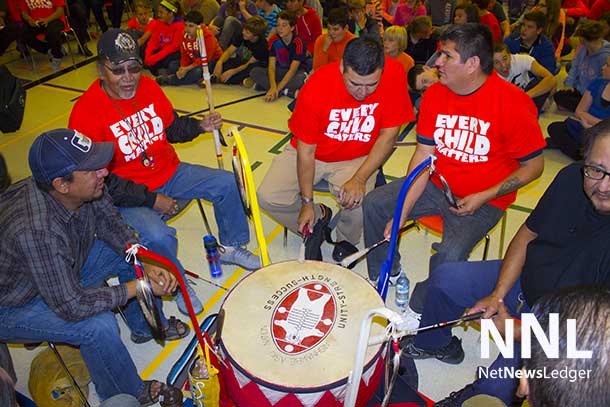Robinson-Superior Treaty and Fort William First Nation Territory, Thunder Bay – Following opening remarks by returning President and co-founder of ABPA, Jason Rasevych, and an opening blessing by Fort William First Nation Elder Victor Pelletier, forum events kicked off with an impassioned and frank discussion about the state of reconciliation with MPP Sol Mamakwa.
Highlights of Mr. Mamakwa’s conversation with moderators Rachael Paquette (ABPA Co-founder and Vice President and founder of Paquette & Associates Law) and Brian Davey (ABPA Director and Executive Director of the Nishnawbe Aski Development Fund) included:
- • The need for non-Indigenous leadership to demonstrate authentic commitment to understanding and mitigating the harmful legacy of colonialism after Prime Minister Trudeau’s scheduled family vacation on Canada’s first National Day for Truth and Reconciliation, and the Ontario government’s refusal to recognize the day as a statutory holiday
- • The need for all First Nations people, and youth, to understand the power inherent in their treaty rights, and to rise together to use this power to advocate for essential basic infrastructure, like housing, and to assert their jurisdiction and nationhood, without fear of losing funding
- • First Nations-led economic development is essential to ensure sustainable development in the North
- • First Nations must work harder to find their commonalities to leverage strength in working together so as not to fall prey to the colonial tactic of ‘divide and conquer’
- • Ontario, unlike British Columbia, appears to be a very long way from implementing a provincial framework to ensure alignment with the principles of the United Nations Declaration on the Rights of Indigenous Peoples despite Mr. Mamakwa’s attempt to introduce a private members bill to facilitate this in 2019
Following the keynote leadership discussion, Martin Kaiser represented event Alpha Sponsor, Resolute Forest Products, to provide a short presentation on ways they are partnering with First Nations to support First Nations socio-economic development and sustainability in the forestry sector. Kaiser, Resolute’s Ontario Woodlands Services Manager, highlighted their 20-year partnership with Fort William First Nation related to its sawmill there, which he claimed is one of the busiest in North
America. Other event sponsors included Business Development Bank of Canada, Valard Construction LLP, and Tamarack Mining Services.
The second panel discussion on high-speed internet as a game changer for First Nations in Northern Ontario highlighted the Rapid Lynx network which will be the first ultra-high speed fibre optic network in Northern Ontario that will be owned and operated by First Nations. Wayne Slipperjack, Rapid Lynx Manager in training and Sherry McCuller, Senior Broadband Consultant for Magellan Advisors LLC and current project lead for Rapid Lynx Phase 1 infrastructure build, discussed the challenges of constructing this network in the north and what they are doing to support digital literacy skills development to ensure uptake once the network is complete in March 2023. Entrepreneurs Lee Barter, COO of Tamarack Mining Services, and Kyle Pearce, Vice President Community Integration for Inspire Resources shared their innovative business models to provide examples of how high-speed connectivity can enable community-led economic development related to mining. ABPA Secretary and Treasurer, Jason Thompson, moderated.
In the final panel discussion, Cherie Brant, Partner at Borden Ladner & Gervais, Geordie Hungerford, CEO of the First Nations Financial Management Board, and Tabatha Bull, President and CEO of Canadian Council for Aboriginal Business, shared their experience and insights related to the enabling conditions required to ensure equitable partnerships. Brant spoke of the need for more focus on relationships outside of just the economic or business model of any project stating that “if the numbers break down, and there is no relationship there, then you have a very high-risk project.” Hungerford emphasized the need for governments to develop pathways to capacity building for First Nation players as well as the critical role that securities regulators can play to ensure material
Indigenous issues are part of ESG considerations. Bull talked about building more time into projects to ensure First Nations participants can actively participate, distinguishing between equitable versus
equal opportunities, and she also emphasized the need for new recruitment approaches for Indigenous board governance and executive positions that better assess capacity and ability versus formal credentials. All three panelists discussed full prior and informed consent and the implementation of UNDRIP principles, however, Brant pointed out that FPIC merely sets a minimum standard and that if industry players are proactive in partnering there is no reason why we can’t forge effective and equitable partnerships from which Indigenous and all Canadians can benefit.
Event segments will be available for public viewing online over the next few weeks through www.anishnawbebusiness.com





